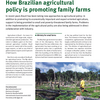When poverty reduction and market access go hand in hand: How Brazilian agricultural policy is promoting family farms
For a long time Brazilian agricultural policy focused on the interests of large-scale agriculture. Due to political pressure and the victory of the Brazilian Workers' Party in the elections, the concerns of small family farms threatened with poverty and loss of food security came into the political spotlight in the last decade. The government launched a series of new programmes, the primary goals of which were to hedge against livelihood risks and integrate family farms in the market. Industry was integrated in the implementation of the politically motivated schemes.
A clearly defined target group, regional delimitation, and financial ceilings limit the risk of uncontrolled surplus production and runaway public spending. The foundation for an innovative agricultural policy was thus laid.
Franziska Junker
Agricultural policy and food security expert
Deutsche Gesellschaft für Internationale Zusammenarbeit (GIZ)
Franziska.Junker@giz.de
Kai Schütz
Agricultural policy and rural development expert
Deutsche Gesellschaft für Internationale Zusammenarbeit (GIZ)
Kai.Schuetz@giz.de




